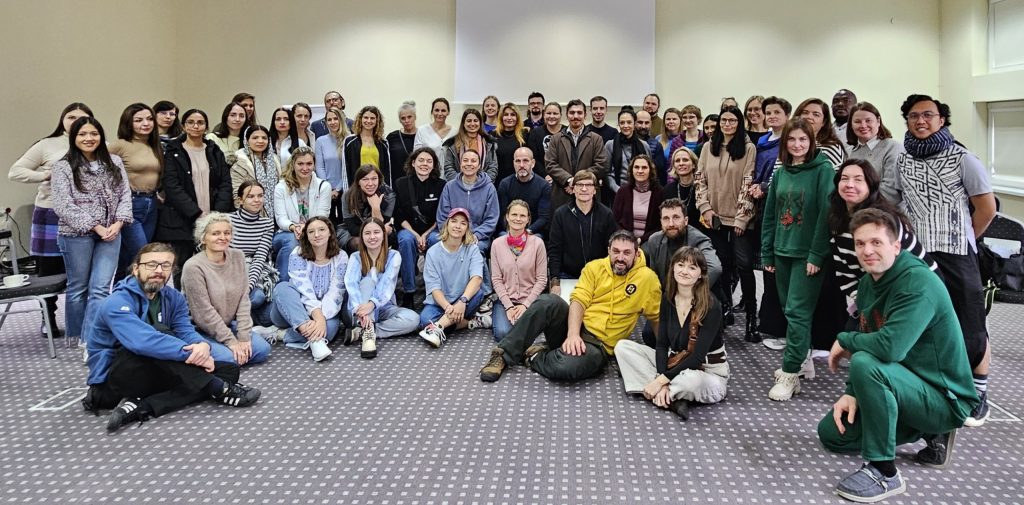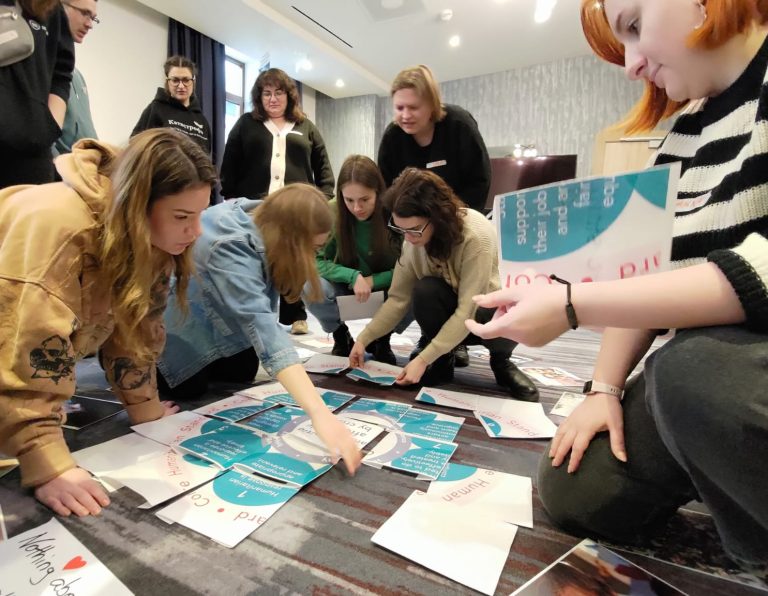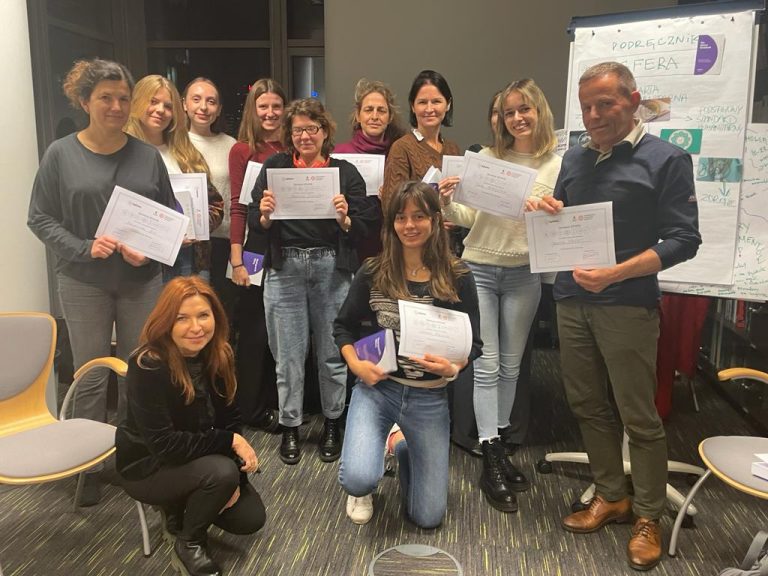27th February 2024
Committed to delivering humanitarian responses in an innovative and transformational way, the Humanitarian Leadership Academy explores new approaches to supporting localisation, strengthening civil society, and leadership. The latter was the focus of a new learning event we organised in Warsaw together with the Eco-Leadership Institute.
The HLA invited Dr Simon Western and the Eco-Leadership Institute to partner to address the humanitarian sector’s challenges. The idea was to think strategically together to create a change process that could spread virally across the wider humanitarian sector, shifting away from its present stuckness.
In November 2023, 60 humanitarians from Eastern Europe and beyond gathered in Warsaw, Poland, for the Leadership Game – an experiential learning event. The participants had various levels of experience and represented different types of organisations, such as NGOs, INGOs, CSOs, as well as businesses. The participants explored various discourses of leadership, concentrating mostly on Eco-Leadership.
Samantha Davis, HLA’s Deputy Director – Learning and Programmes, consultant at the Leadership Game:
The Humanitarian Leadership Academy’s adoption of Eco-Leadership focuses on the holistic perspective, recognising the importance of addressing both the immediate crisis impact and the root causes. Eco-Leadership’s flexibility and responsiveness to local conditions complements the HLA’s efforts in diverse regions like Eastern Europe. It’s about enabling the development of tailored strategies that resonate with local needs. This approach addresses current humanitarian challenges and prepares leaders for future crises, emphasising adaptability and forward-thinking.
The format of the event differed from a usual training or workshop. The organisers and consultants described it as a journey of experiential learning rather than a classic programme with presentations and seminars. The consultants were not moderators or facilitators: even though they provided an agenda for the day and directions for different sessions, the participants had a lot of freedom and control over how their journey went. This concept and lack of strict structure during the learning event can be challenging for people from cultures with prevalent traditional educational systems with a teacher-led approach, as it used to be in many Eastern European countries.
People who prefer technical or hierarchical leadership styles or cognitive classical classroom learning will be challenged to steer their direction of travel, take responsibility for the chances and risks taken or avoided, and eventually, might fall disengaged. Ultimately, experiential learning is for everybody, as learning occurs on a personal and group level and provides opportunities to question the usual ways of working and the habits people are holding onto to date.
The event tries to open a space where people can learn differently. I’ve been in leadership education for over 20 years. Even though working on concepts and sharing ideas is good, you can’t learn leadership from a book. You can only learn it from experience, and it’s not easy learning. What often happens at these events is that people who found it difficult or even say they didn’t like it so much still learn something. They go back to their workplace, see something that reminds them of something that happened at the event, and they make a connection and learn.
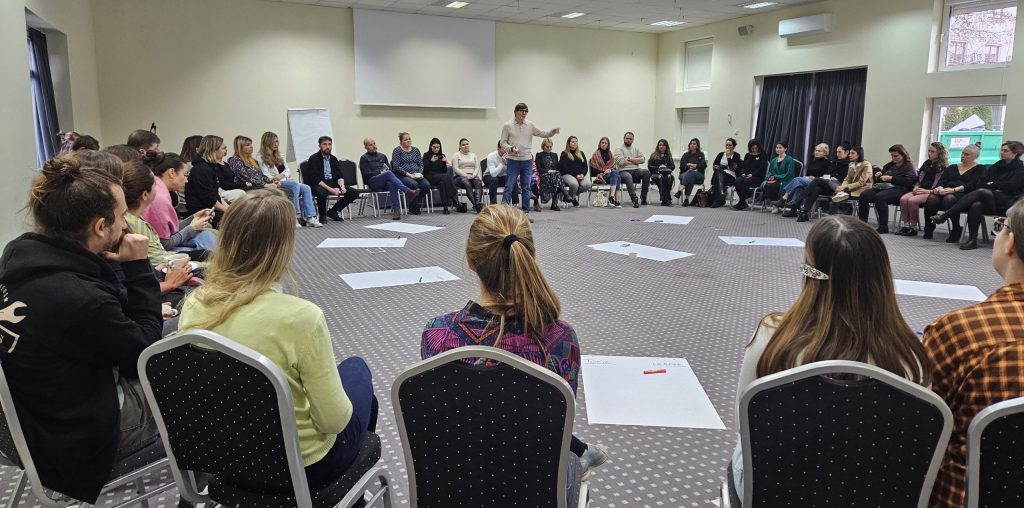
The event fostered self-reflection, reflection on the event itself, and analysis of today’s humanitarian system in general. During free association matrix sessions – an exercise new to most participants – a safe space was created to openly share emerging reflections, thoughts, and ideas without clarifying, judging or commenting. Being in the room, it was apparent that participants reacted to the new format in various ways. While some felt uncertain without a clear structure to the discussion and hesitated to actively participate, others enjoyed the experience and the freedom of expression. Providing feedback, some shared that they would like to introduce a free association matrix into their workplace to improve communication within their teams.
The free association matrix is an exercise based on the psychoanalysis technique developed by Sigmund Freud, called free association. It involves expressing the content of one’s consciousness without any censorship. During the free association matrix sessions, participants are encouraged to share any thoughts and reflections that emerge during the day. They are not required to explain themselves, nor are they expected to answer or comment on previous speakers.
The goal is to uncover shared themes, symbols, and patterns that may emerge from the free associations. The matrix helps reveal patterns and themes that may be implicit or unrecognised in the group’s conscious discussions, and they are often linked with creative thinking and problem-solving, offering unique perspectives and solutions to collective challenges. This reflective process works towards resolution and improved collaboration. Finally, the practice fosters a sense of shared experience and connectivity among group members.
There were so many ideas that emerged during these days. The beauty of doing this in the free association matrix, where there is no judgement, no right or wrong, and being able to freely express created a phenomenal power of connectivity in that room. I am leaving the event so much richer and more energised. I’ve learnt an incredible amount in the last three days.
One of the things that struck me within this space, that was different from other events, was the amount of silence within the group. I don’t know if that is a reflective or a fearful silence, whether it manifests the system or the context we are in at the minute. But it is one of the things I took from the event in terms of people’s ability to sit comfortably, or sometimes uncomfortably, in silence.
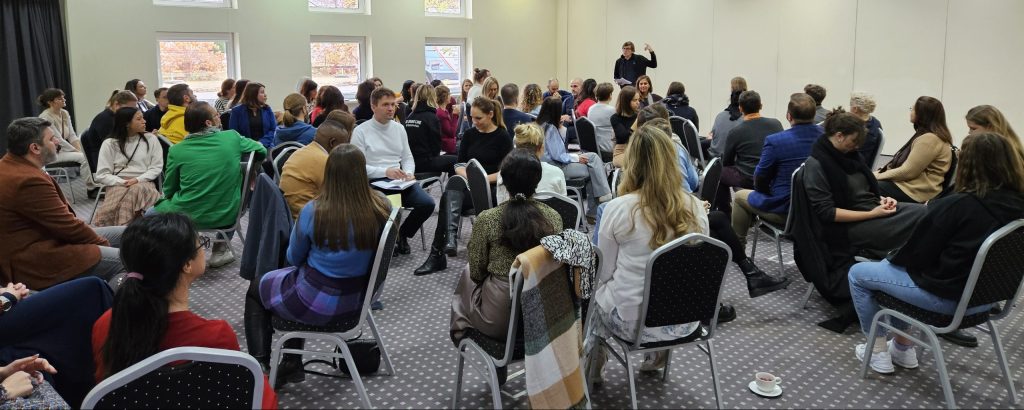
As a more traditional part of the learning event, Dr Simon Western delivered the seminar on four discourses of leadership: controller, therapist, messiah, and eco-leader. After the seminar, participants explored these discourses on practice while working in groups. The participants were free to form groups with various numbers of people and adopt any type of leadership approach while working on various topics relevant to the humanitarian sector. This activity let the participants explore how various types of leadership affect the dynamics and productivity in the groups.
Usama Kayani, participant, shares:
The event encouraged us to experiment with different roles in leadership and followership, providing a real-time understanding of how team dynamics evolve under various leadership styles. We engaged in a variety of activities, working in small and large groups, which allowed us to explore the deeper dynamics of teamwork, authority, power, and the impact of emotional intelligence on leadership. For me, one of the most impactful learnings was the emphasis on distributed leadership and active followership. These are fundamental elements of eco-leadership, where the focus is not just on leading but also on enabling others to lead, creating a more adaptive and resilient organisational culture.
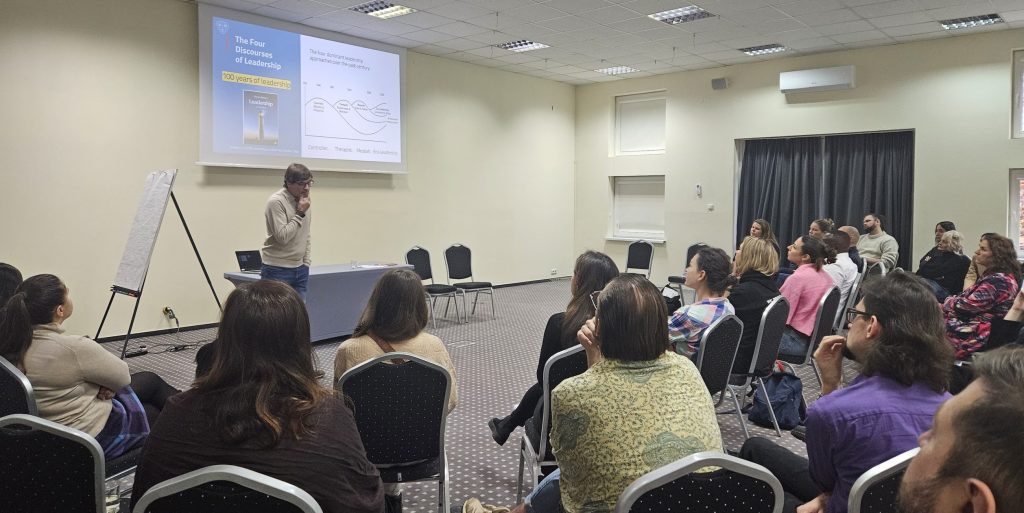
As one of the main objectives of the Eco-Leadership concept is creating well-connected ecosystems, working in groups was the way of exploring this area. Participants highlighted that networking during the event not only allowed them to learn from each other’s experiences but also created a feeling of connectivity. Some participants formed potential partnerships based on similar challenges they faced and overcame in their day-to-day work.
The idea is that we are a part of the ecosystem and should consider our actions as a part of something bigger. Finding our role in a larger environment is very important. It was also great that the event focused on the local leaders and not, as usual, on international leaders.
As part of my current work, I am building an ecosystem around one of the initiatives I support. This program has advanced my knowledge about the different dimensions and challenges involved in that journey, which I need to take into consideration. I am taking with me relationships with new colleagues and inspiration from the work they have been doing. I am particularly inspired by people who have built great social initiatives in Ukraine, especially those who work in rural areas.
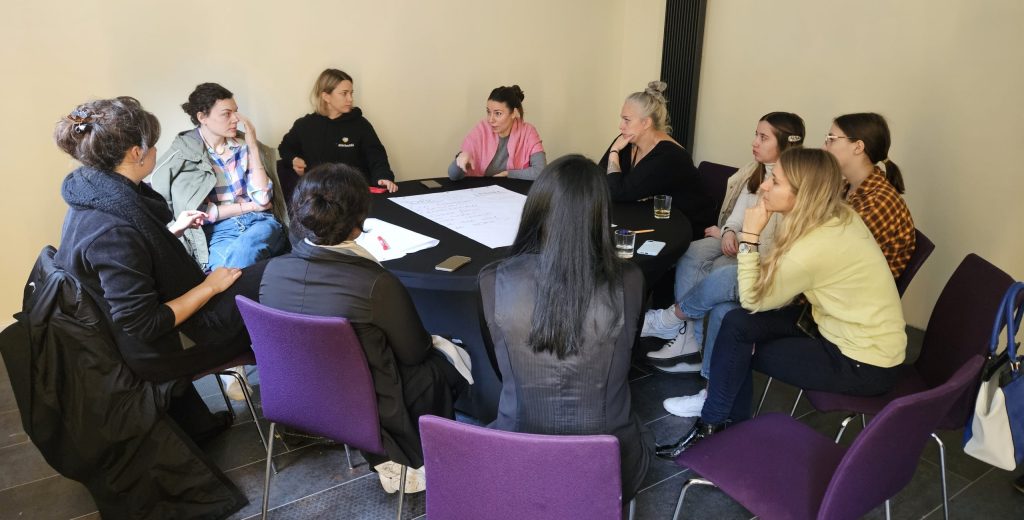
The Leadership Game introduced two more new concepts to the participants: composting and re-enchantment. Composting, in this context, means both processing new information and reflecting on the experience, including introspective reflection. Re-enchantment is described as ‘putting the soul back into the work’.
I always talk about re-enchantment in opposition to disengagement. While smaller NGOs are often adaptive and entrepreneurial, bigger organisations can often be too bureaucratic, making their employees and partners work like machines and feel like no one listens to them. So, there is quite a disenchantment with the system. This kind of event re-energises people because they get an opportunity to meet other people and share their challenges and best practices. They can learn from each other, and they can learn from experience. There is no good in saying: “You should do this; you should do that”. If they are not re-energised, it won’t happen. I talk about re-enchantment because, in this, people find new energy, find their passion, rediscover their purpose, and then change will take place.
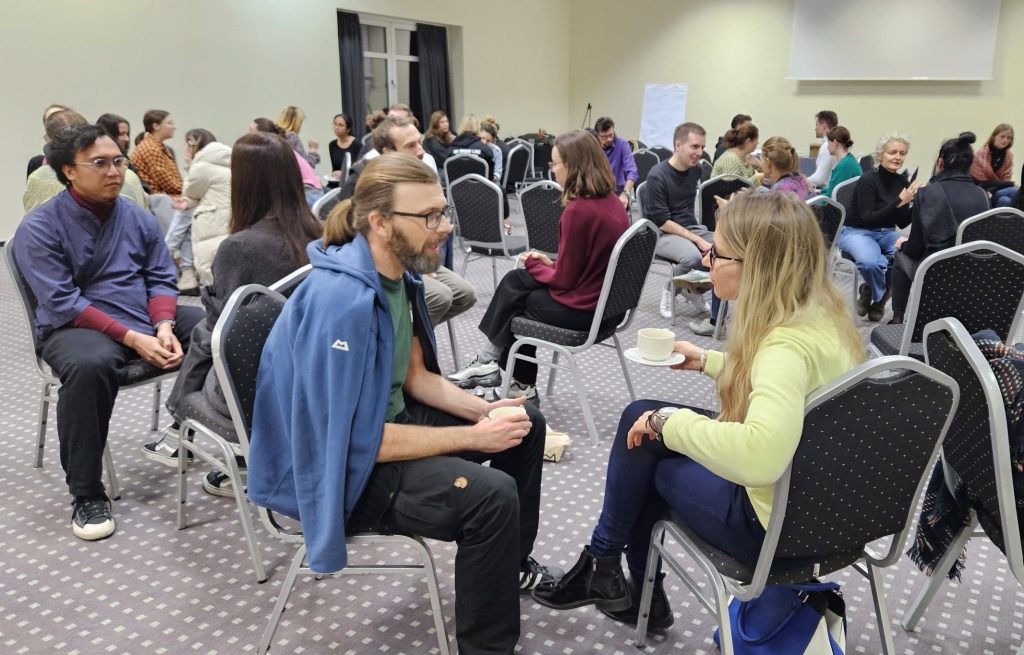
Implementing the principles of Eco-Leadership, such as practicing collaboration and mutual support and addressing issues within their organisations and areas of influence, could have a cascading effect on the sector. Therefore, one of the learning event’s goals was to inspire the participants to make their first move adopting these practices, which could lead to wider systemic changes. Organisations which take up eco-mutualist principles may influence policies, regulations, and societal norms, creating a more equitable and sustainable humanitarian system. Dr Simon Western dwells on what this change should be and what the first steps to start the shift are:
I think that change doesn’t come from the top down, or if we wait for it to come from the top down, we can wait for a very long time. I offer the participants to give a leadership questionnaire to their teams to think about where they are now and where they need to be. Let’s start by putting the idea of eco-mutualism at the heart of the work and question the power structure. So, you ask who is at the table, who is not at the table, whose voices are and are not heard. How do you engage people in the ecosystem? For example, how do you engage aid recipients in co-producing their own aid rather than just donating? How do you engage civil society organisations to work in partnerships and collaborations? So, you are starting to ask these questions about the ecosystem of your own team, and this inherently makes you think about where power lies and how you can make it more equitable.
The face-to-face workshops mark a pivotal phase in the Eco-Leadership Pilot Programme. However, the programme goes beyond the learning events. Its online component incorporates eight modules with 42 graduates completing the programme across East and Southern Africa, Asia and Europe.
